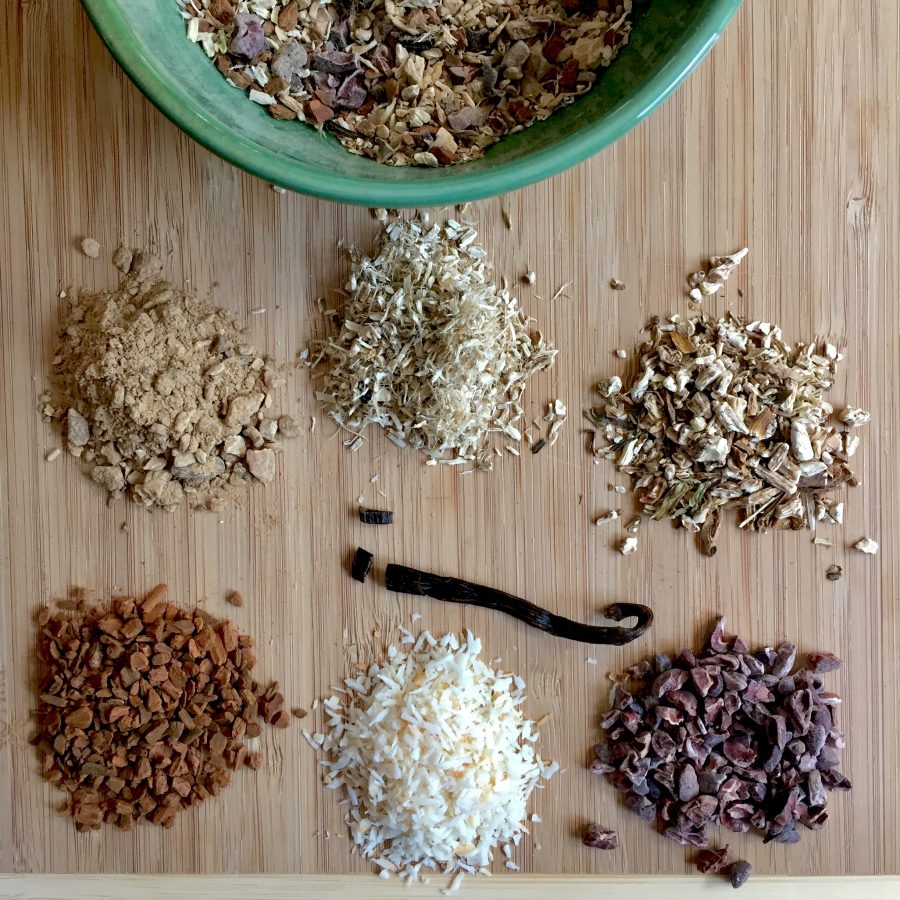In winter, it helps to cozy in with a satisfying tea like this Roasted Roots Cocoa blend. Mostly, it's just a nice, tasty, cozy tea. But, of course, these herbs do have medicinal properties. It gently stimulates digestion, detoxification, energizes, lifts moods, and balances blood sugar (especially if sipped at the end of a meal). Here's how to make it:
- 2 parts cassia cinnamon chips (or 1-2 sticks per mug)
- 2 parts toasted coconut flakes (optional)
- 2 parts cut/sifted marshmallow root
- 1-2 parts roasted cocoa nibs
- 1-2 parts roasted chicory root
- 1 part dandelion root
- 1/2-1 part snipped vanilla bean (or 1 ml or 1/4 tsp vanilla extract per mug)
Steep 1-2 heaping teaspoons of the blend per 8-16 ounces of tea for about 15 minutes. The flavor will get stronger and deeper (but also more bitter) if you let it steep longer or decoct (simmer) it.
Let's take a closer look at the ingredients:

Cassia Cinnamon Chips or Sticks: Cinnamon provides a little sweetness, warmth, and spice to pull together the other flavor in this blend. It also helps balance blood sugar by making cells more receptive to insulin. Cinnamon powder gets pretty slimy in water, but the chips or sticks hold their own without creating "cinnamon snot" on the bottom of your glass or sliming up your tea strainer.
Toasted Coconut Flakes: This adds a pleasant, slightly sweet, almost creamy yum factor to tea blends. I simply use unsweetened coconut flakes that I toast in a skillet over low/medium heat until aromatic and lightly browned. Another great tea featuring toasted coconut would be a more barebones coconut-cocoa nibs-vanilla tea (think: Samoa cookie or Mounds candy bar... If I wasn't allergic to nuts, I might add toasted slivered almonds to the mix). Even without sugar or cream, it's quite tasty and subtly sweet.
Marshmallow Root: This great gut-healing tea adds a slightly velvety texture and subtle sweet-woody flavor from the mucilaginous starches. I love marshmallow root (and leaf) as a pleasant, bland background flavor and texture in teas blends. The mucilage also gives a moistening, hydrating quality to teas. The mucilage won't be particularly strong in a quick steep -- you get more from letting it steep for several hours -- but it still provides a lovely supportive/backbone role in this blend.
Roasted Cacao Nibs: Cacao (sometimes called cocoa) provides a bitter chocolate-y flavor, antioxidant, and some caffeine. A 15-20 minute steep of cocoa nibs hits the sweet spot of extracting nice cocoa flavor without getting overly bitter. Vanilla and toasted coconut both elevate and sweeten its flavor. The cocoa flavor of cocoa nibs in tea is subtly rich, not like hot cocoa.
Roasted Chicory Root: This weedy root is closely related to dandelion and is best known as a coffee substitute. It contains no caffeine (though you will get some caffeine from the cacao nibs) but provides a bitter, earthy flavor somewhat like coffee. Combined with cinnamon and the other ingredients, the flavor softens. Medicinally, chicory roots have similar properties as dandelion. You can dry-roast your own in a skillet or on a baking sheet in the oven, but usually it's already available roasted by bulk herb suppliers.
Dandelion Root: Raw (not roasted) dandelion root has a subtle bitter, chocolate/coffee-ish flavor with the slightest hint of woodsy sweetness. Medicinally, dandelion root stimulates digestion and, indirectly, elimination. It gently moves the liver and kidneys to detoxify the body more effectively, which makes it supportive in a wide range of conditions including skin eruptions/acne, sluggish digestion, high cholesterol and hypertension, hormonal issues, cancer adjunct care, high blood sugar, and more. It's also rich in minerals, though you won't get much of those from this quick 15-minute steep (you'll get more from a decoction.) As mention, chicory roots offer similar properties.
Vanilla: This tropical orchid bean softens and harmonizes the flavors, adding a sweetness to the blend. It also has mood-elevating, calming, soothing, and antioxidant properties. You can snip a vanilla bean into small bits to store with the other ingredients in a tightly-sealed jar. But, the cost of vanilla has skyrocketed. I have a minor obsession with vanilla bean and pure extract and use it frequently. Unfortunately, climate change and tropical storms have pummeled vanilla growers. I used to be able to get an ounce of organic, fair-trade vanilla beans for $8 from Mountain Rose Herbs. Now, they cost $52! (Fortunately, I had a small stockpile before the price hike that I'm coveting closely.) Vanilla bean extract makes a perfectly acceptable swap out and may even taste better. I adore the flavor of Simply Organics brand sold by Frontier Co-op. I transfer it into a dropper bottle and add a squirt (1/5 teaspoon or 1 ml) per cup.
Many other ingredients would work well in this blend depending on your flavor preferences and health goals:
Burdock Root: Similar to dandelion roots, burdock adds earthy-bitter sweetness (slightly less bitter than dandelion and chicory) with gentle detoxification support, specifically via the liver and lymph.
Reishi Mushrooms Slices or Powder: Antioxidant, anti-inflammatory, mildly energizing adaptogen, nervine, tonic, bitter. You'll get more medicine (particularly the immune-modulating polysaccharides) if you simmer it. While not extremely palatable on its own (it's more bitter-woodsy than mushroomy), it blends well with bitter herb roots, cocoa, coffee, cinnamon, and spices.
Ashwagandha Root: Provides deep energy with some calming-nervine effects. Mildly boosting to the thyroid. Alone its flavor is so-so, reminiscent of earthy roots and raw potatoes, but it blends easily with tastier herbs.
Codonopsis Root: Called "poor man's ginseng" this unrelated but medicinally similar root has deep, energizing, stimulating, immune tonic properties. It tastes sweet and quite pleasant. Though less expensive and more sustainable than ginseng, it's not exactly cheap.
Maca Powder: Maca, a turnip-like root from the Andes, has a delicious, sweet flavor reminiscent of the inside of a malted milk ball. It blends fabulously with chocolate, coffee, and vanilla flavors. Medicinally, it's rich in nutrition (protein, iron, other minerals) and seems to have mildly energizing, mood elevating (without being overly stimulating) adaptogenic properties and a particular affinity for hormone balance, fertility, and libido in men and women. Unfortunately, thanks to the Chinese mafia and herb industry, maca is often adulterated (such as with maltodextrin), so purchase from organic, fair-trade Peruvian maca from a reputable company that performs quality control tests on their products. Maca (much like cinnamon powder) gets slimy in water and difficult to strain, so you may prefer simply stirring it into your hot water.
Cardamom, Nutmeg, Ginger, Star Anise, Ceylon Cinnamon: Delicious spices, based on your preferences. It's easy to overdo the first four, so just add a little bit (1-2 cardamom pods, pinch of nutmeg, 1/4 teaspoon ginger, 1 star anise pod per mug). One or two Ceylon sticks per mug.
Clinical herbalist Maria Noël Groves sees clients and teaches classes at Wintergreen Botanicals Herbal Clinic & Education Center in Allenstown, New Hampshire.
The statements made on this blog have not been evaluated by the FDA and are not intended to diagnose, prescribe, recommend, or offer medical advice. Please see your health care practitioner for help regarding choices and to avoid herb-drug interactions.

